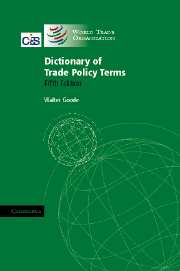Summary
Jackson-Vanik amendment: an amendment to the 1974 United States Trade Act proposed by Senator Henry Jackson (D) and Representative Charles Vanik (D) and enacted as Section 402. It denies the granting of most-favoured-nation treatment(MFN) to non-market economies if they (a) deny their citizens the right to emigrate, (b) impose more than a nominal tax on emigration and (c) impose more than a nominal charge on citizens if they wish to emigrate. The President may waive the requirement for full compliance with Section 402 if he determines that this will substantially promote the freedom-of-emigration provisions, and if he has received assurances that the emigration practices of the country will lead substantially to the achievement of this objective. The Jackson-Vanik amendment was aimed originally at the USSR, but it was also used against other countries. Withdrawal of MFN means that the high tariff rates contained in the Smoot-Hawley Tariff Act (the Tariff Act of 1930) apply. These would make an exporter quite uncompetitive in the United States market. See also conditional most-favoured-nation treatment and normal trade relations.
Japanese measures on leather: a case launched under the GATT in 1983 by the United States. It concerned import restrictions maintained by Japan on bovine, equine, sheep, lamb, goat and kid leather. Japan explained that its restrictions reflected the historical, cultural and socio-economic background of the “Dowa problem”.
- Type
- Chapter
- Information
- Dictionary of Trade Policy Terms , pp. 252 - 254Publisher: Cambridge University PressPrint publication year: 2007



